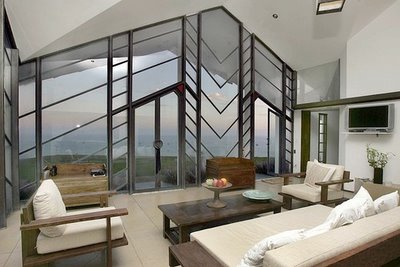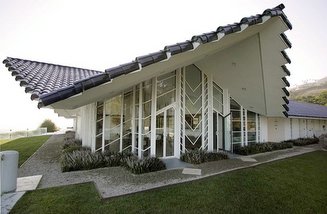 William Wesley Peters was Frank Lloyd Wright's first apprentice, and for three decades he was a structural engineer and project architect for commissions that helped to define American design, most notably Fallingwater, arguably the most acclaimed home ever built in the U.S. Though relegated to a footnote in the telling of Wright's storied career, Peters did leave behind a portfolio of his own work, not the least of which is an idiosyncratic house that sits modestly on a most unmodest stretch of the Malibu coast.
William Wesley Peters was Frank Lloyd Wright's first apprentice, and for three decades he was a structural engineer and project architect for commissions that helped to define American design, most notably Fallingwater, arguably the most acclaimed home ever built in the U.S. Though relegated to a footnote in the telling of Wright's storied career, Peters did leave behind a portfolio of his own work, not the least of which is an idiosyncratic house that sits modestly on a most unmodest stretch of the Malibu coast.Drive past the tabloid photographers camped outside Brad Pitt's compound on Pacific Coast Highway, get buzzed through a white entry gate, then ramble down the long, sloped driveway, and you'll see it — the Benton House, one of Peters' last creations, part Modernist box, part Buddhist temple. The pitched roof looks Asian in inspiration, sheathed in shimmering tiles, each shaped like a rolling wave and glazed a cerulean blue.

 The front door leads to a living room that feels like a temple of sorts, a reverent homage to Mother Nature more than any deity. Walls are spider webs of glass, geometric grids of copper mullions patinated blue with age, each framing an angular window to the Pacific.
The front door leads to a living room that feels like a temple of sorts, a reverent homage to Mother Nature more than any deity. Walls are spider webs of glass, geometric grids of copper mullions patinated blue with age, each framing an angular window to the Pacific."Strangely enough, when I first saw the house, I didn't like the diagonals across the glass," says Sinan Revell, a painter, photographer and performance artist who bought the house in 2004 with her husband, Graeme. "But I really have grown to love the design and how the lines actually frame the view. The little squares are so delicate. Of course, once you step outside, all heaven breaks loose."
Indeed, the Revells' 5 acres form a miniature peninsula that tilts gently, then drops precipitously 100 feet to the ocean. Stand on the lawn, and seagulls flap at eye level. The backyard feels like the end of the Earth — because it is.
A path wends down 185 steps to the biggest surprise: a petite and private promontory where Sinan likes to meditate, accompanied only by black cormorants and views stretching half a dozen miles south to Point Dume. "Sometimes," Graeme adds, "you can see dolphins surfing."
Peters, who died in 1991, clearly understood that the magic of the property lay not in any structure he could erect, but rather in the land itself. On a coastline studded with grandiose mansions and the architectural equivalent of a hurricane, this house speaks in soft sunlight and ocean breezes.
(Excerpts from an article by Craig Nakano)
No comments:
Post a Comment